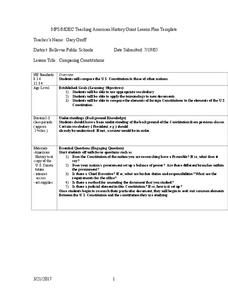Curated OER
Examine Your State Government's Demographics
How is your state government organized? How many elected officials are women? What is the mean age of your state representatives? Young scholars answer these questions in a research project before creating a chart to reflect their...
Curated OER
Comparing Constitutions
Students compare and contrast plans for government. In this government systems lesson, students compare and contrast the U.S. Constitution to the constitutions of selected countries using the provided checklist as a guide. Students...
Curated OER
Twelve Angry Men: Trial by Jury as a Right and as a Political Institution
Students explore the constitutional guarantee of the right to trial by jury. For this U. S. Constitution lesson, students read or view Twelve Angry Men and respond to discussion questions regarding the jury. Students examine the...
Curated OER
Local Government: Caring for Your Community
Seventh graders investigate the role of local governments. In this government instructional activity, 7th graders examine historical photographs and determine what services are being performed in the photographs. Students...
Curated OER
What Can You Find in the Cabinet?
Looking in the cabinet can be fascinating! Examine the various departments of the Executive Cabinet in this group research project, which jigsaws so each small group has a different department and presents to the class. Groups create...
Youth Outreach
Connecting the Separate Powers
Scholars demonstrate what they know about the separation of powers through role play. Two individuals act out a skit as the remaining class members discuss and decide whether the interaction they observed is an appropriate example...
Curated OER
Checks and Balances
Students take a closer look at the responsibilities of the Legislative, Judicial, and Executive branches. In this U.S. government lesson plan, students read articles 1, 2, and 3 of the Constitution and then use Venn diagrams to compare...
Curated OER
Follow the Leader
Here is a phenomenal lesson on the three branches of government for your second and third-graders. It presents this often-confusing information in an easy-to-understand format. Many excellent activities and worksheets are embedded in the...
Curated OER
The Role of Individuals and Groups in the Census
Students learn why the census makes a difference. In this U.S. Census lesson plan, students describe and explain the roles that individuals, government agencies, and partner groups play in the census.
C-SPAN
Middle School Checks and Balances
Seven video clips reveal how the checks and balances built into the constitutional framework of the United states' government are designed to keep any one branch from becoming too powerful. After watching each clip, groups identify the...
C-SPAN
Choice Board: Expressed and Implied Powers
Article 1, Section 8 of the United States Constitution expressly lists powers given to Congress. Over the years, lawmakers have expanded the enumerated powers to include powers implied by the list. To better understand the significance...
Curated OER
Compare the United States Government with Other Political Systems
Young scholars explore the U.S. form of government and illustrate other forms of government found throughout the world. They explain the similarities and differences between the U.S and other governments.
Curated OER
WHO'S IN CHARGE?
Third graders explore the three branches of government, their origins and the purposes of government. Each team develop a PowerPoint presentation of their findings. Stjudents also explore how to be a good citizen.
Curated OER
Lesson 2: The Constitution: Our Guiding Document
Explore the structure and content of the US Constitution in the second lesson of this five-part social studies series. A collection of activities, games, and videos complement a class reading of a document summarizing the US...
Curated OER
It's Your Right: A Civil Rights Brochure
Learners examine the US Constitution, Bill of Rights, and Supreme Court cases in order to broaden their understanding of the US Judicial System. They research a variety of textual and Internet resources to create a tri-fold brochure,...
National Endowment for the Humanities
James Madison: Raising an Army—Balancing the States and the Federal Government
To war! To war! Every nation in the history of the world has had to deal with warfare on some level. Scholars go through a series of activities and discussions surrounding the development of the Constitution to help them better...
Curated OER
Lesson 2: The Tired King
Students are introduced to the three functions of government (legislative, judicial, and executive). They read and discuss a story about an overworked king who must handle all the tasks of government. Students give a description of the...
Curated OER
Lobbying
Learners examine the role of lobbyists in Washington, D.C. In this Legislative Branch lesson, students watch video segments and read excerpts about lobbying. Learners write essays that explore the pros and cons of lobbying.
Curated OER
The Legislative Branch
Students identify and describe the key terms as they relate to the Legislative Branch. Students describe how members of Congress are selected, how laws are created, and two of the limits on powers of Congress.
Curated OER
Essentials of the US Constitution
Students determine how the content of the U.S. Government enables the U.S. Government to function. They examine the roles and functions of the three branches of government and how the separation of powers and checks and balances affect...
Curated OER
Supreme Court Decisions and Their Effect On Us
Consider five Supreme Court cases and how their outcomes have directly affected the American population. Government young scholars research and compose a 1-2 page pager outlining the examples of our daily life that have specifically been...
Curated OER
iCivics: Court Quest
Students explore the responsibilities of the Supreme Court. In this judicial branch lesson, students play an online game that requires them to respond to questions regarding the Supreme Court's responsibilities.
National Endowment for the Humanities
The President Under the Articles of Confederation
The Articles of Confederation sounds like one big, fancy title to middle schoolers. Here, scaffolded steps help to ease novices into understanding this all-important American document. Discussion questions, lesson activities, and ideas...
National Endowment for the Humanities
George Washington: The Precedent President
Everyone knows that George Washington was the first president, but do your scholars know why that was so important? The lesson plan, the third in a sequence of three, allows learners to understand how George Washington set a precedent...

























